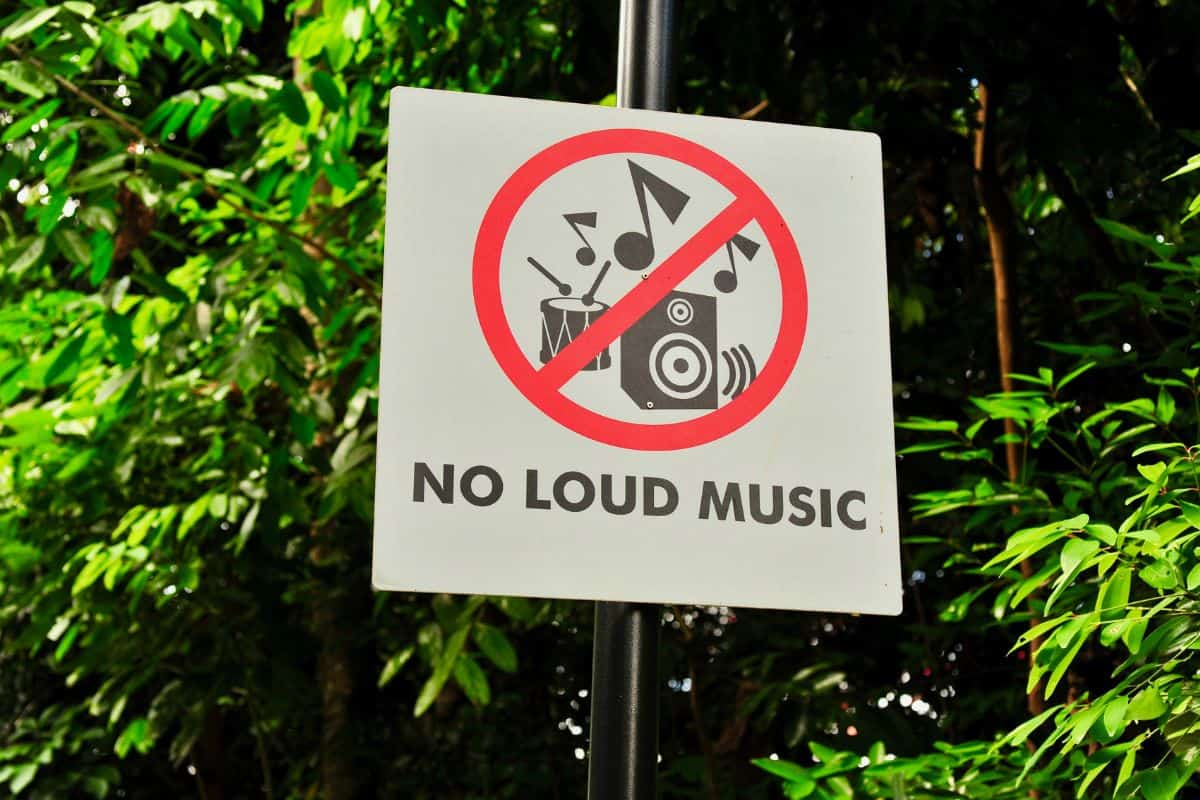This page may contain affiliate links. If you click and buy, we might get a small commission at no cost to you.
One of the most frustrating things you can experience is loud music waking you up at night. To make matters worse, how you handle the situation could potentially cause strife between you and your neighbor. Before you angrily march over and pound on their door, consider the following tips on what to do if your neighbors play loud music at night.
What to do if your neighbors play loud music at night
The best thing to do when your neighbors are playing loud music at night is to remain calm and cool, even when you are feeling furious. There is truth in the old saying “calmer heads will prevail”, and maintaining a level of civility can go a long way to making yourself feel heard.
1. Speak with your neighbor

The first step you should do when confronted with a noisy neighbor is to speak to them directly. You may find out that your neighbors didn’t know that their loud music was causing problems. When you do speak with them, do so calmly and rationally, and avoid acting in an aggressive or mean manner.
Let them know that their music is a bit too loud, and ask them if they can turn it down. The key here is to be polite. You should also be open to brainstorming potential solutions with your neighbor.
For example, if they cannot stop playing music at night because they are practicing for a concert, see if you can come to an agreement for them to stop playing the music after a certain time.
Some people may find speaking with their neighbor about problems an uncomfortable situation. But if you can get over your uncomfortableness, you will find that open communication with your neighbor is the best option to handle any problems that come up between you two.
2. Document the noise issue
Make sure you are documenting the noise issue. This includes keeping a log of when the noise starts and when it ends.
You should also consider recording the noise with your phone so that others can potentially hear how loud it is while inside your home. This information will come in handy if you have to take the noise issue further, such as through legal channels or mediation.
3. Find out what your local noise ordinance is
Even before you speak to your neighbor, you may want to find out what your local ordinances are in regards to noise. Most cities have ordinances and rules in regards to noise issues.
This includes barking dogs and even loud music. While these ordinances typically do not go into effect during the daylight hours, they can help stop the loud music your neighbor is playing.
In most cases, the offending person will be issued a warning and even a fine.
4. Let your neighbor know that you will need to take further action
If you have spoken to your neighbor and they have either refused to turn down the music or are continuing to play the music loudly at night, you may want to warn them that you are left with no other action but to contact the landlord (if you live in an apartment) or the police. Again, when you speak to them, always do so calmly and politely.
Even if you feel like they are brushing off you and your concerns, you still want to keep a level head and not try to retaliate against them.

5. Report the noise to your landlord
This tip is only useful if you live in an apartment building or you know that your neighbors are renting their place from another person. Contacting their landlord about the issue may help to get the message across to your neighbors that their music is too loud at night.
Some landlords can even evict a tenant if they are too loud and disruptive in the apartment complex or neighborhood.
6. Bring in a mediator
Bringing in a third party mediator to help come up with a solution to the noise problem can sometimes be just the trick needed to find common ground between you and your neighbors. Some cities even offer free or low-cost mediator services to help squash disputes between neighbors.
The mediator will set a time and place for you and your neighbors to meet them, and then discuss the noise issue and potential solutions that you both can live with. Keep in mind, however, that there is no guarantee that your neighbors will agree to mediation.
7. Contact the police
Contacting the police about the noise issue should be a last resort, no one likes calling the police if they don’t have to. What the police will do is visit your neighbors and let them know that there has been a complaint about the loud music.
They will then ask the neighbor to turn the music down. The next step depends on the local laws and ordinances regarding noise.
In some cases, your neighbor could potentially be issued a fine if they refuse to turn down the music or if the police are continuously called to their property for a noise complaint. What the police probably won’t do is arrest your neighbor.
It’s even possible that the neighbor could turn the volume up even louder after the police leave just to anger you. Now you have a feud on your hands. It’s a delicate situation and you certainly shouldn’t take calling the authorities lightly.



